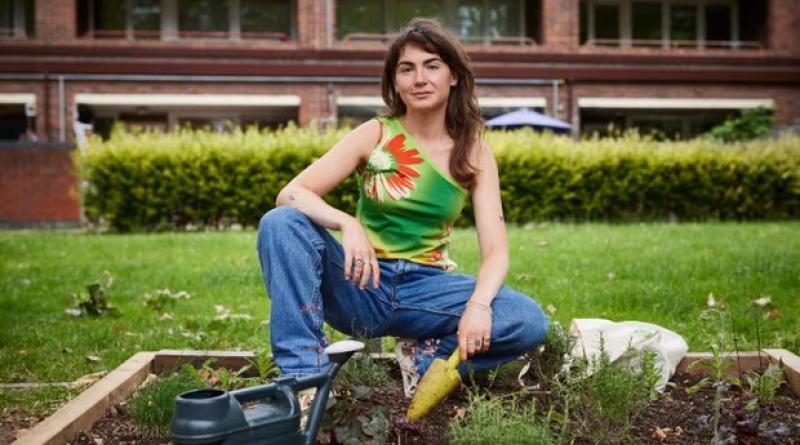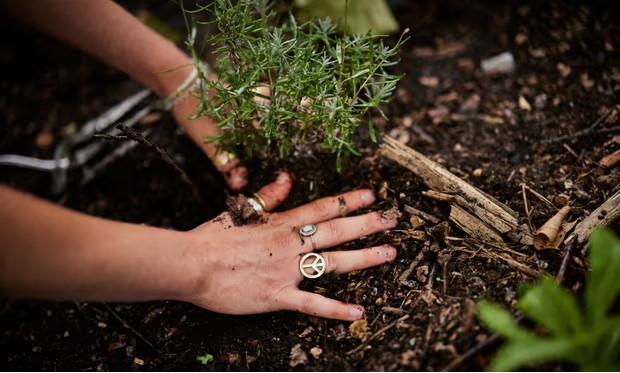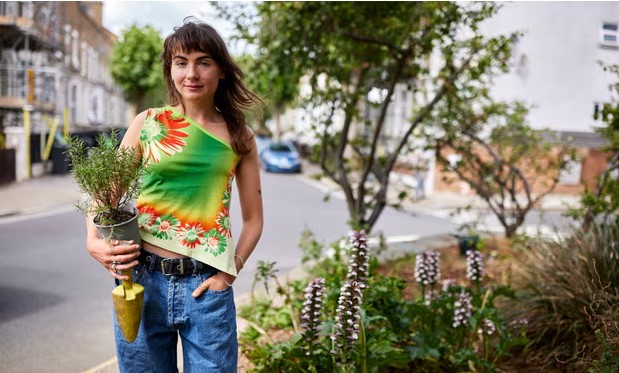‘I call it botanarchy’: The Hackney guerrilla gardener bringing power to the people

For author Ellen Miles, planting in public spaces is a radical act that’s about community ownership and belonging
Anarchism gets a bad rep. In the popular imagination, anarchists dress in black, they smash windows and hurl firebombs at police. Or else, they are young social misfits with green hair and too many piercings. Often they are both.
But what if anarchy could be beautiful, what if it could bring local communities together planting flowers in the streets? For Ellen Miles, the new doyenne of guerrilla gardening, it is. “I call it botanarchy,” she says.
With trowel in one hand and watering can in the other, Miles is inspiring young people to take up rakes and hoes, not to wave them at the gates of Downing Street, but to till the soil in the neglected flower beds and green patches of their streets and estates.
And in so doing, she says, they are not just brightening up the concrete vistas of urban cityscapes, but beginning the essential adaptations industrialised societies need to make to preserve biodiversity and become more resilient to global heating – and all the while challenging the liberal capitalist state.
“Guerrilla gardening is the practice of planting in public spaces in your neighbourhood” she says on a humid summer afternoon, walking between outlaw flower beds in Hackney, east London.
“And that’s how I define it … because, for me, it’s all about community ownership and belonging, and I think we have a right to cultivate these spaces in the areas we call home – and a responsibility to, as well.
“So-called public spaces have been really privatised, and communities actually don’t get a chance to interact with them often. So I think we do have a right to do that in the places we put down our roots, where we live.”

But in order to enjoy that natural right, guerrilla gardeners upturn another right, one which has become foundational to western society: the right to property. “Some people don’t [realise], they are not really aware; but for me guerrilla gardening is the Trojan horse into anarchist ideals.
“It’s wholesome, but that’s the thing: it’s not all about violence and hate, it can be wholesome. And it’s fundamentally about bringing people together to shape the places we live. We shouldn’t be prevented from improving our neighbourhoods by powers that don’t really live here or care.”
Miles doesn’t like the terms TikToker, influencer or content creator, but it is through social media that, over the past two years, she has reached a mass audience. Her how-to videos based on her own guerrilla gardening exploits have been viewed millions of times. Now that project has matured into a book, Get Guerrilla Gardening, that was published in June by Dorling Kindersley, and Miles is showing the Guardian around her patch to explain how it has all came together.
For anyone interested in doing it themselves, the story of how Miles became involved in guerrilla gardening is instructive. It began at the start of lockdown, she says. “I saw it as a mutual aid thing, a way to get people out and connected to nature when the parks were closed, where people didn’t have gardens, people were isolated.”
Angered by the injustice, she began a campaign calling for access to green nature to be enshrined in the Universal Declaration of Human Rights. Nature Is A Human Right became the subject of Miles’s first book, an anthology of essays. But her attempts to persuade the council to give spaces to the community so that they could interact with nature proved fruitless.

She realised that, in the short term at least, change would have to come from the people themselves. Introduced by a friend to the idea of “tactical urbanism”, a movement of people taking ownership of their shared urban spaces, she fell in love with its green arm: guerrilla gardening. By her own account clueless about where to begin with gardening, Miles turned to the community, posting on the local Covid mutual aid WhatsApp group, the Facebook page for Hackney’s chapter of Extinction Rebellion, and even on Nextdoor.
She found allies straight away. “Basically, guerrilla gardeners are everywhere,” she says, it’s just that most people, mindful that what they are doing is not technically legal, don’t advertise it. The people she connected with were not only willing to join her in outlaw horticulture, but also able to provide plants, compost and tools.
As we wander through Homerton, Miles points to the guerrilla gardens hiding in plain sight. A patch of chard here, a resplendent display of flowers outside someone’s home there. “I didn’t invent guerrilla gardening,” she says. “I’m not the only person doing it; they’re everywhere. And one of the things I say in the book is, often when I started talking to people about it, they were like: ‘Oh, I’ve done that. I did that on the towpath because I have a canal boat, or I did that with my friend outside of whatever.’ It’s just about showing people that you can do it.”
And, in the face of urbanisation and environmental crisis, the need to do it – to do something – is becoming ever more urgent. For Miles, guerrilla gardening and nature as a human right are two prongs of the same social change pincer movement. “Guerrilla gardening is like the ground up, grassroots way to make neighbourhoods greener and connect people to nature, and the nature is a human right campaign is the long-term, top-down way to do it,” she says.
“I see it all as fighting for the same kind of thing really: a world where human habitats are more filled with nature than they are deprived of it, and where there’s equitable access to nature.”
The benefits are not purely social. Greening our cities is crucial as more of us are packed into them, as temperatures rise, and as what wildlife remains on Earth becomes increasingly squeezed out by settlements, industry and agriculture. Plants can help to reduce air pollution, Miles points out; they can mitigate the urban heat island effect, which is contributing to lethal heatwaves; and they provide habitats and food for the insects, birds and animals that we are realising form crucial links in the web of life.
Most of all, Miles points out, guerrilla gardening is a way that people can take back not only their present, but also their future – even as it seems under dire threat from an economic and social system apparently hellbent on human self-eradication.
“I do think there is an issue in society at the moment with the lack of agency and autonomy for people,” she says. “Guerrilla gardening, even if it is just sowing something in a tree bed, it might not change the world – you might help some bees, you might bring joy to someone walking down the street – but you’re also reminding people, or awakening something that is like ‘Maybe this is how it should be.’
“We know now that we can’t trust the government to do this stuff. We have to take it into our own hands.”
Photograph: David Levene/The Guardian - Guerilla gardener Ellen Miles in Hackney, east London.





